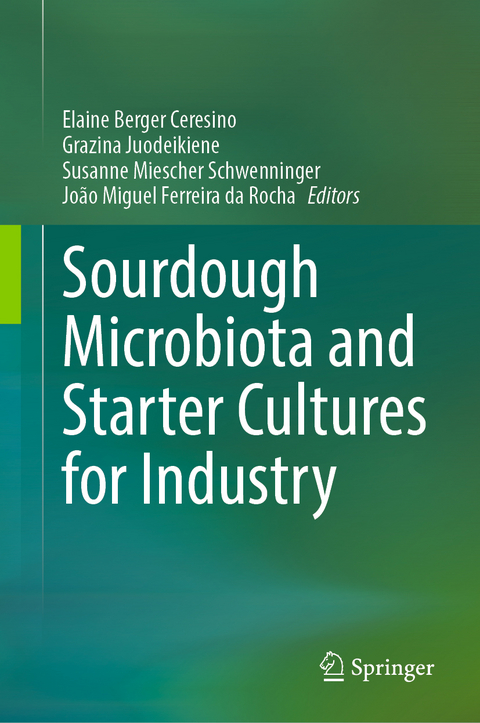
Sourdough Microbiota and Starter Cultures for Industry
Springer International Publishing (Verlag)
978-3-031-48603-6 (ISBN)
Traditional sourdough bread refers to spontaneous fermentation of cereals by lactic acid bacteria and yeasts, leading to natural selections of microorganisms. The metabolic activity of these microorganisms promotes the formation of organic acids, flavor development and leavening in food matrices, which most know as sourdough bread. This bread is still widely manufactured at farm level across Europe and worldwide, being highly appreciated by consumers for its distinct flavor, texture, healthy attributes and natural origin.
Sourdough bread is expected to grow 6.9% annually through 2023. Once stagnant, the bread market has experienced a revival specifically through sourdough bread consumption. Consumers have been avoiding bread in the recent years due to the presence of extra ingredients such as chemical dough conditioners, preservatives and added sugar. However, the increasing popularity of fermented foods and their multiple health benefits are prompting the growthof sourdough market. This fast-growing market has been demanding a dynamic response from industries producing starter cultures to accelerate sourdough fermented bread production in increasing quantities while keeping its "made-for-you" characteristics. By bringing together top sourdough experts in Europe and beyond, this book compiles the latest knowledge in all areas of sourdough starter culture and advantages in using sourdough fermentation.
Sourdough Microbiota and Starter Cultures for Industry supplies a biosciences' audience with a hands on view of the latest advances from sourdough microbiota characterization to starter culture potentials targeting industrial application, including specific techno-functional and safety improvements obtained by clean-labeling strategies. Insights on health and improved quality shed light on new shifting consumer preferences and why choosing sourdough fermentation is a great expansion opportunity in one's portfolio as thescience behind sourdough starter cultures meets improved nutrition-impact opportunities. This text teaches methods to exploit sourdough technology through the entire value chain from sourdough natural microflora through the development of novel starter cultures for producing fermented food, introducing the advantages that sourdough fermentation offers for improving the sensorial, technological and nutritional properties of breads.
Elaine Berger Ceresino is a Researcher at the Swedish University of Agricultural Sciences in the Department of Plant Breeding in Alnarp, Sweden
Grazina Juodeikiene is a Professor at Kaunas University of Technology in the Department of Food Science and Technology in Kaunas, Lithuania
Susanne Miescher Schwenninger is a Professor at ZHAW School of Life Sciences and Facility Management, Research Group for Food Biotechnology in Wädenswil, Switzerland
João Miguel Ferreira da Rocha is a researcher at University of Porto, Department of Chemistry and Biochemistry in Porto, Portugal
Overview of sourdough microbiota.- Sourdough microbiota diversity in Southern Europe.- Sourdough microbiota diversity in Central Europe.- Traditional and novel applications of sourdough microbes in Northern Europe and the Baltic Countries.- Microbiological and biomolecular methods applicable to the isolation, characterization and identification of microbial sourdough strains.- Undesirable microorganisms in cereal flours and their impact on the stability of sourdough microbiome.- Metagenomics analysis of sourdough microbiota.- Metabolic engineering of lactic acid bacteria and yeasts for the production of compounds with industrial applications.- Immobilization techniques applicable to sourdough.- Sourdough-based starter cultures for fermentation in agri-food industry.- Sourdough lactic acid bacteria as functional microorganisms for technological purposes.- Yeast Strains from Sourdough as Potential Clean-Label Starters for Fermentation Processes.- Health promoting features of sourdough lactic acid bacteria.- Rope and mould spoilage in breadmaking - risk analysis.- Impact of sourdough microbiota on FODMAPs and ATI content in bakery products.- Recent advances in the use of sourdough fermentation to improve the quality of gluten-free bakery products.
| Erscheinungsdatum | 18.04.2024 |
|---|---|
| Zusatzinfo | VIII, 495 p. 37 illus., 29 illus. in color. |
| Verlagsort | Cham |
| Sprache | englisch |
| Maße | 155 x 235 mm |
| Themenwelt | Naturwissenschaften ► Biologie ► Mikrobiologie / Immunologie |
| Naturwissenschaften ► Chemie ► Technische Chemie | |
| Technik ► Lebensmitteltechnologie | |
| Schlagworte | Bread Industry • sourdough • Sourdough Fermentation • Sourdough Microbiota • Sourdough Technology |
| ISBN-10 | 3-031-48603-X / 303148603X |
| ISBN-13 | 978-3-031-48603-6 / 9783031486036 |
| Zustand | Neuware |
| Informationen gemäß Produktsicherheitsverordnung (GPSR) | |
| Haben Sie eine Frage zum Produkt? |
aus dem Bereich


